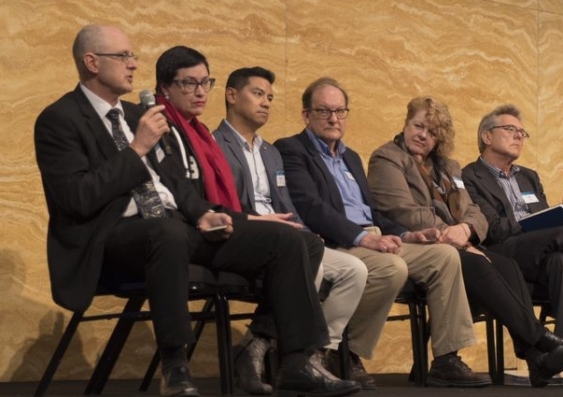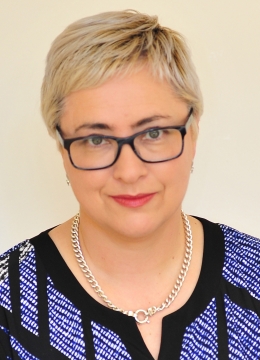UNSW panel ponders thorny issues surrounding use of student data
A panel of professionals, academics and students at UNSW Sydney has discussed some tricky ethical questions about how universities handle student data.
A panel of professionals, academics and students at UNSW Sydney has discussed some tricky ethical questions about how universities handle student data.

Mikayla Keen
UNSW Media & Content
+61 (0)401 488 562
mikayla.keen@unsw.edu.au
Students interacting with University systems and services leave behind personal information and behavioural data: some data are explicitly requested from students, some are collected incidentally.
Should we worry how that information is being used? And what usage is acceptable and ethical?
Issues of privacy and consent around the usage of personal data has made headlines recently, with Facebook reporting yet another breach and Russians accused of manipulating election results via social media.
Together with these concerns, several questions were considered by a panel of nine professionals, academics and students as part of the UNSW Inspired Learning Summit on September 27.
The public discussion, on Ethics and Acceptable Use of Student Data, is believed to be the first of its kind for any Australian university.
'We can join up the CCTV with the student system, with Facebook, with any other system we like ... We don’t aggregate data from internal and external sources at present. But should we?'
Almost 300 participants, onsite and via livestream, listened as panellists discussed issues including the types of data collected and why.
Led by Dr Lorenzo Vigentini - Academic Lead, Educational Intelligence and Analytics at UNSW - the summit comes as UNSW undertakes a comprehensive review of privacy, consents and the uses of personal data.
Among concepts raised by the panel was the potential for making student data available to algorithms driven by artificial intelligence.
Pro Vice-Chancellor (Education) Geoffrey Crisp posed questions about whether AI could help the University keep track of students, guide them about their performance or advise them about potential risks of failing.

UNSW Pro Vice-Chancellor (Education) Professor Geoffrey Crisp posed questions about the potential for data to be used in artificial intelligence.
He also said learning analytics could be a useful source of information, but asked how much data should be given to teachers about their students’ interactions with digital learning resources.
There might be legitimate reasons a teacher might want to know something - for example, how many reading resources to upload, he said.
“However, once the teacher starts getting access to the data … about which student did what … this is actually the same person who’s going to be marking their exam or their next essay. So does that have any influence on [those things or] is it completely separate from that?
“They’re the things that we are now grappling with in terms of the use of the data that we have.”
Another controversial issue was about students’ privacy and the potential uses of student data.
Kate Carruthers is Chief Data and Analytics Officer for UNSW Sydney and is on the advisory board of the NSW Data Analytics Centre, which facilitates data sharing between government agencies.
Ms Carruthers said technology exists which would allow university administrators to combine a range of data from different systems.
But this raises concerns about the nature of the consents that students and other parties provide to the University.
“We can join up all the data sets if we want to. We can join up the CCTV with the student system, with Facebook, with any other system we like. We have the technology to do that,” she said.
“We don’t aggregate data from internal and external sources at present. But should we? And when do we start to cross over from being prudent aggregators of data into a creepiness factor, and how do we then manage it?

UNSW Chief Data and Analytics Officer, Kate Carruthers: "When do we start to cross over from being prudent aggregators of data into a creepiness factor?"
“There’s a lot of things that we could do and many things that we might want to think about before we do them.”
Although UNSW has the technological ability to track, say, whether a student was attending a class, Ms Carruthers said such use of data did not align with the University’s pedagogy.
However, the same type of data, in a de-identified form, could theoretically be used for determining, for example, whether the numbers of students attending certain locations on campus might warrant the creation of extra services.
Students raised questions about the idea of anonymity and the fact that in several applications knowing who they are does not matter for improving services.
This is the case for automatic data collection via sensors, but also the feedback they provide via end-of-semester evaluations.
The discussion also touched on the University’s ‘social licence’ to operate (SLO), a reference to the concept that institutions need a kind of ‘social permission’ from stakeholders to conduct their business.
Peter Leonard is a lawyer and principal of Data Synergies, a business and legal consultancy for data-driven businesses.
He is also Professor of Practice at UNSW Business School and chairs the Australian IoT (Internet of Things) Alliance’s Data Access and Use Workstream.
Mr Leonard spoke about SLO as “acting fairly and responsibly, beyond mere compliance with laws”.
“In business [this is] sometimes expressed as acting with corporate social responsibility; acting ‘ethically’; maintaining trust of relevant stakeholders, be they customers, consumers or citizens issues about policy and governance and warned against,” he said.
The panel also covered the concept of students’ “right to be forgotten”, and whether this is even possible when the University has to juggle between reporting duties to the government and duty of care to students and staff.
Such duties are essential to foster a culture of openness and transparency while preserving individuals’ rights to confidentiality and privacy.
The Inspired Learning Summit (ILS) was the biggest centrally-managed education event held at UNSW Sydney, in terms of attraction and attendance.
Based within the Portfolio of the Pro Vice-Chancellor (Education), the ILS is an annual event celebrating educational innovations and partnerships at UNSW.
The 2018 ILS, with the theme Students as Partners, marks the second year of the UNSW 2025 Inspired Learning Initiative.
To receive communications including a link to the panel session’s video recording and resources from the Summit presentations, subscribe to the PVC (Education) eBulletin.